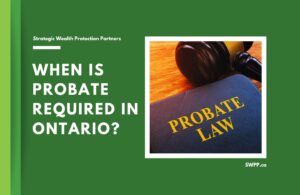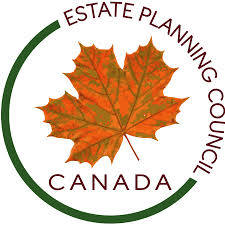Written by Ron Cooke, President & Founder of Strategic Wealth Protection Partners in Ontario, CEA®, Member of the Estate Planning Council Canada
Is Life Insurance Taxable in Canada?
In most cases, life insurance payouts are not taxable in Canada.
When someone passes away and their beneficiary receives a lump sum payment from a life insurance policy, that money is usually tax-free.
The beneficiary typically does not have to report it as income, and it is not included in the deceased person’s final tax return.
However, there are some exceptions. For example, if a corporation owns the policy, the tax treatment can be more complex. Similarly, if the policy includes an investment component, such as a whole life policy with cash value, there could be tax implications.
Additionally, if the estate is named as the beneficiary rather than an individual, the payout might be used to pay off estate debts or taxes, which could affect what beneficiaries ultimately receive.
However, for most people who are named as beneficiaries on a personal life insurance policy, the money they receive is tax-free.

Key Takeaways
- Most life insurance death benefits in Canada are paid tax-free to named beneficiaries
- Business-paid premiums may be tax-deductible but can create taxable benefits for employees
- Corporate-owned policies have unique tax implications and require careful planning
- Organizing policies and naming beneficiaries avoids delays and reduces stress
- Life insurance is one of the most misunderstood financial tools available that offers great benefits for estate planning.
What Is a Life Insurance Payout in Canada?
A life insurance payout, also called a death benefit, is the lump sum paid by an insurance company when the insured person passes away.
This payment is made to the named beneficiary, which could be a spouse, child, business partner, or even a trust. The purpose is to replace income, cover debts, or fund estate obligations such as final taxes or capital gains.
The Canada Revenue Agency does not typically treat the death benefit as taxable income when it’s paid directly to a named beneficiary. But the details of the policy and how it’s owned can impact the tax outcome.

When Can Life Insurance Become Taxable?
While most life insurance payouts are not taxable in Canada, there are exceptions.
The Canada Revenue Agency may apply tax implications in several situations. If the policy is corporate owned, the death benefit may flow through the capital dividend account to shareholders tax free. If a cash surrender value policy is surrendered before death, the gain above the adjusted cost basis is taxable income.
Similarly, if policy loans are taken and not repaid, tax may apply to withdrawn amounts.
These cases are complex and can impact both personal and business tax planning if not structured properly. Seek a professional with insurance and estate planning experience.

How Is Corporate-Owned Life Insurance Taxed in Canada?
When a corporation owns a life insurance policy, the death benefit is typically received tax-free by the company.
However, the Canada Revenue Agency requires that the policy’s ACB be deducted from the death benefit before calculating how much can flow through the capital dividend account. This can reduce how much the shareholders receive tax free.
If a portion of the death benefit exceeds what’s allowed to flow tax-free, then any excess could be taxed if distributed to shareholders as a income. Additionally, policy loans taken by the company may create taxable income if improperly reported or structured.
In estate planning, corporate owned life insurance can be a powerful tool but it needs to be aligned with the company’s shareholder agreements, succession plan, and long-term tax strategy.

What Happens If There Is No Named Beneficiary on an Insurance Policy?
If there is no named beneficiary, the death benefit is paid to the deceased’s estate.
Once that happens, the money becomes part of the estate and is subject to the probate process in Ontario. This means delays, additional legal costs, and possibly even exposure to creditors or disputes.
Worse still, the death benefit may lose its tax-free status. If the estate receives the funds, they could be treated as part of the taxable estate and used in the overall calculation of tax liability, especially where corporate-owned policies or high value permanent plans are involved.
Naming a beneficiary avoids this issue and ensures the payout goes directly to the intended recipient without probate or unnecessary tax risk.

Is the Cash Value of Life Insurance Taxable?
The cash value of a whole life or universal life insurance policy is not taxed while it grows inside the policy.
But if the policy is surrendered, or if money is withdrawn in excess of the adjusted cost basis, the Canada Revenue Agency will treat that excess as taxable income.
If a policy loan is taken and not repaid especially if it was used for personal expenses, there can also be tax implications.
However, using the cash surrender value as collateral to borrow for investments or business purposes may avoid triggering immediate tax, while providing liquidity and strategic leverage. This approach allows you to access the value inside the policy without directly withdrawing it, which can be especially useful for long-term estate or tax planning.
📖Related Read: Is Life Insurance Worth It?
Are Life Insurance Premiums Tax Deductible or Taxable in Canada?
In Canada, life insurance premiums are generally not tax deductible when paid for personal coverage.
The Canada Revenue Agency considers personal life insurance to be a non-deductible expense, much like groceries or home insurance. The exception comes into play when a corporation purchases the policy, and even then, the deduction is limited and depends heavily on the structure and purpose of the policy.
In a business context, if the insurance company is providing group life insurance to employees, the premiums paid by the employer are often tax deductible to the business.
However, the value of that group coverage is considered a taxable benefit to the employee.
Corporate-owned policies used to secure a business loan may qualify for a partial deduction, but the rules are strict and must meet Canada Revenue Agency conditions. It’s not a one-size-fits-all answer it requires precise alignment with tax strategy and legal structure.

How Does Life Insurance Fit Into Tax Planning?
Life insurance is one of the most underused yet effective tools in Canadian tax planning.
It allows families and business owners to create a reliable, tax-free solution for settling taxes that arise at death. This includes final taxes on registered accounts, capital gains on real estate, and private company shares. It can also be used to fund charitable legacies, replace lost income, or stabilize the financial impact on a surviving family or business.
The death of a taxpayer can trigger a surprisingly large bill, something most families are not emotionally or financially prepared for. Life insurance turns that future risk into a guaranteed death benefit paid exactly when it is needed most. That is the kind of planning that preserves estates, protects inheritances, and prevents wealth from being lost to unnecessary taxes.
How to Make Life Insurance Easy for Your Beneficiaries
It is one thing to own life insurance, but it is another thing entirely to make it easy for your loved ones to access it.
After a death, emotions run high and decision-making gets cloudy. Clear, organized documentation is one of the greatest gifts you can leave behind.
To help ensure your beneficiaries receive their death benefit quickly and without stress:
- Keep your policy documents in a safe but accessible place and make sure someone knows where to find them
- Review your named beneficiaries regularly to make sure they still reflect your wishes
- Avoid naming your estate as the default recipient to bypass probate and reduce delays
Also, make sure your beneficiaries know the name of the insurance company and have basic details such as the policy number. This can significantly reduce the time it takes to receive the death benefit payout.

Common Questions about Life Insurance Payouts in Canada
Do I have to pay taxes on money received from a life insurance policy?
No, most death benefits paid to a named beneficiary are not considered taxable income in Canada.
Will life insurance affect my estate taxes in Canada?
Only if the payout goes to your estate. If paid to a named beneficiary, it usually bypasses probate and tax.
Are Canadian life insurance proceeds taxable in the U.S.?
They may be, depending on the residency and citizenship of the recipient. U.S. citizens should seek cross-border tax advice.
How quickly do life insurance beneficiaries get paid in Canada?
Typically within 5 to 30 business days after submitting all required documents to the insurance company.
Can life insurance be used to pay off debts or funeral costs?
Yes, the death benefit can be used for anything including debts, estate equalization, funeral costs, and final tax bills.
Can I name more than one beneficiary on my life insurance policy?
Yes, you can name multiple beneficiaries and allocate percentages to each. You can also state if they are to receive lump sum or annual payments for say 15 years.
What happens if a beneficiary dies before the policyholder?
If no contingent beneficiary is named, the payout may go to the estate, possibly triggering probate.
Can I access my life insurance while I’m alive?
Yes, if your policy has a cash surrender value, you may borrow or withdraw funds while alive.
Can the government take my life insurance payout?
Not if it is paid directly to a named beneficiary. If it goes to your estate, creditors may have access.
What is a permanent life insurance policy?
It is coverage that lasts your entire lifetime and may build cash value over time.
Is life insurance tax deductible?
Generally no, unless the insurance is assigned to a bank for a loan. Then the amount of the loan is tax deductible.
Is life insurance considered an asset in Canada?
Yes, if it has cash surrender value, it can be treated as an asset for some legal and financial purposes.
Is the $2500 death benefit taxable in Canada?
The CPP death benefit is considered taxable income to the recipient and must be reported.
Final Thoughts on Life Insurance and Taxes in Canada
In most cases, life insurance payouts are not taxable in Canada.
That’s one of its greatest advantages. But certain situations like corporate ownership, policy loans, or surrendering policies with cash surrender value can create unexpected tax implications.
That’s why careful planning is so important. With the right setup, life insurance becomes one of the most reliable and tax efficient ways to transfer wealth and support your family when they need it most.
Discover How to Minimize Taxes and Secure Your Legacy
Did you know that without a solid estate plan, taxes and fees in Ontario could claim a significant portion of your wealth?
If you’ve worked hard to build your business, investments, and properties, protecting your legacy for your loved ones is critical. At Strategic Wealth Protection Partners, we specialize in helping high-net-worth individuals in Ontario secure their financial futures.
Our Living Estate Plan is designed to:
- Reduce estate taxes and probate fees.
- Simplify wealth transfer to your loved ones.
- Reflect your values and priorities in every detail.
Your Legacy Matters
With our personalized guidance, we’ll help you navigate options like Living Trusts to protect your assets and ensure your family’s peace of mind. Contact us today to book your Living Estate Plan Consultation and take the first step toward a secure future.
Schedule a Living Estate Plan Consultation
Planning your legacy is about more than numbers—it’s about ensuring your family remembers you and your values are honoured for many years to come.
Estate planning and trusts can feel overwhelming, especially if it’s your first time. That’s why we’re here.
With our simple, 5-Step Living Estate Plan, we make the process easy, helping you create a comprehensive estate plan or trust that protects your assets from taxes and probate fees while preserving your legacy. Tools like The Final Word Journal capture your story, wishes, and essential details like accounts and end-of-life plans, ensuring your family has clarity and comfort.
Take the first step today—schedule a consultation call and give your family the ultimate gift: peace of mind and the assurance they were always your priority.
Read More
If you’re starting your estate planning process, you may find these articles helpful:
- What Is the Final Tax Return After Death in Canada?
- Does Ontario Have a Death Tax?
- Is Life Insurance Taxable in Canada?
- Is Life Insurance Worth It in Canada? Pros & Cons
About the Author
RON COOKE, PRESIDENT & FOUNDER OF STRATEGIC WEALTH PROTECTION PARTNERS

With over 30 years in financial services, I’ve seen the challenges families face when a loved one passes—lost assets, unnecessary taxes, and emotional stress. That’s why I created the Living Estate Plan, a comprehensive process to protect assets, eliminate estate and probate fees, and create legacies that are remembered for many years to come.
This plan ensures your family receives not just your wealth, but a meaningful reminder of your care and love. Tools like The Final Word Journal capture your story, wishes, and essential details, offering clarity and comfort during difficult times.
Your final gift should be more than money—it should be peace of mind, cherished memories, and an organized estate.
Schedule a Call
Schedule a 30-minute consultation call with Strategic Wealth Protection Partners.
Click HERE to schedule a consultation.









